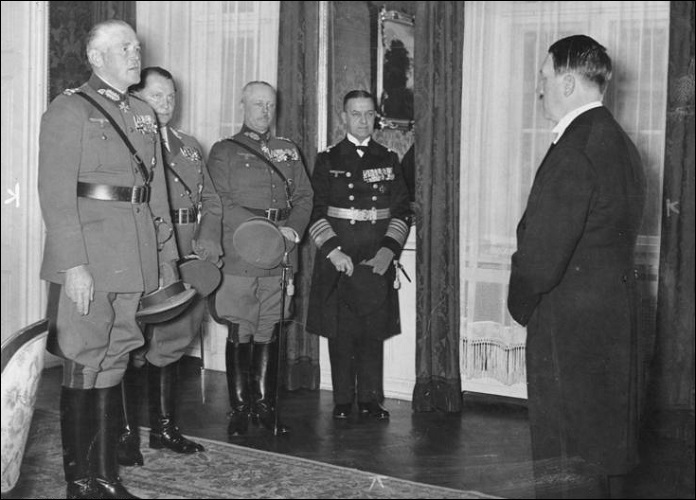By
late 1937 Adolf Hitler’s drive toward war was accelerating.
Since taking power in 1933, the
Führer has denounced the disarmament provisions of
the 1919 Peace Treaty, introduced conscription, built up
Germany’s armed forces, sent troops into the formerly
demilitarized Rhineland, and intervened in the Spanish Civil
War. His attention then turned to Austria and
Czechoslovakia. The former country was Hitler's homeland and
he aspired to incorporate it into the the Reich. The population of the latter country
included three million ethnic Germans, living mostly in the
western area of the country known as the Sudetenland. Hitler
planned to exploit their grievances—some legitimate, some
contrived—using them as a pretext for war and the
destruction of the Czechoslovakian state.
But
the prospect of war alarmed an important group: the senior
officers of the German Army. Believing that an attack on
Czechoslovakia would touch off a general European conflict, all too well aware of the armed forces’ many
deficiencies, the Generalität
was insistent in its objections to Hitler’s plans. The three
key figures were Field Marshal Werner von Blomberg, the
Minister of War; Colonel-General Werner Freiherr von
Fritsch, the Commander-in-Chief of the Army; and
Colonel-General Ludwig Beck, the Chief of the Army General
Staff.
While not
opposed in principle to war, these men believed that Germany
needed more time to prepare, and their opposition to his plans
thoroughly exasperated Hitler. He had never liked the
aristocratic senior officers of the Army, believing with
some reason that many of them disdained him personally as a
low-born former lance corporal and scorned the Nazi Party as
a conglomeration of thugs. But the Führer was wary of
alienating the generals by moving against them. He was well
aware that they could depose him and dismantle the Nazi
regime if they chose to do so and besides, he needed their
expertise to facilitate German rearmament. Clearly the Army
would have to be brought to heel. But how could that be done
without risking a military coup?
Since the
very beginning of Hitler’s political career, luck had been
with him. Now it would serve him again.
Late in
1937 War Minister von Blomberg, a widower in his sixties,
announced his intention of marrying a much younger woman.
The match—Prussian aristocrat and girl of humble background—flattered the egalitarian pretensions of the Nazi regime and Blomberg had no difficulty in obtaining Hitler’s approval.
The Führer even agreed to stand as a witness at the couple’s
wedding, which took place in January 1938.
But
Blomberg’s romantic idyll was short-lived. It soon emerged
that his new wife was a woman with a past. She was, in fact,
a former prostitute, well known to the Berlin police vice
squad. Worse still, she had posed for pornographic
photos taken by an ex-boyfriend. Hitler was enraged and
mortified to have his name associated with this unsavory
tale, all the more so when he learned that the
ex-boyfriend was a Jew.
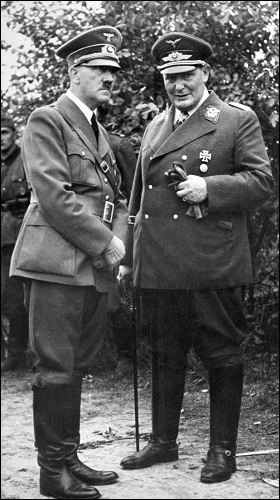
Hitler and
Göring in 1937 (Bundesarchiv)
In the cut-throat Nazi
environment, these revelations were a gift to Blomberg’s
enemies, principally Hermann Göring, Commander-in-Chief of
the Luftwaffe, who resented his subordination to the
Minister of War. He promptly went to Hitler and told him
that that Blomberg must go. Other senior generals, shocked
and embarrassed by Blomberg’s ill-considered actions, gave
the Minister of War no support. As for Hitler, he soon
discerned the scandal’s silver lining. As Minister of War,
Blomberg was the functional commander-in-chief of the armed
forces—Army, Luftwaffe, Navy—a role that the Führer himself
coveted. So when Blomberg was dismissed, Hitler transformed
the War Ministry into the
High Command of the Armed Forces (Oberkommando
der Wehrmacht or OKW)—through which he would exercise direct personal command of
the armed forces.
The Generalität
was not particularly sorry to see Blomberg go.
Though
Göring’s behavior was certainly disreputable, the Blomberg
affair was a genuine scandal, his downfall was of his own
making, and anyhow his brother officers had been wary of the
deposed War Minster on account of his devotion to Hitler. But
there soon followed a slanderous intrigue
against another officer of whom Hitler had tired:
Colonel-General von Fritsch, the
much-admired Commander-in-Chief of the Army.
By early
1938 the Nazi regime had “coordinated” most of German life
and society, absorbing or abolishing all independent organizations
with two key exceptions: the churches and the Army. These
retained a considerable degree of autonomy, the former
because the Nazis feared that public opinion would not yet
tolerate an assault on religion, the latter because its
leaders’ professional knowledge and skills were essential to
Hitler’s war plans. As the Commander-in-Chief of the Army,
Fritsch symbolized that autonomy. Though he approved in
general of the Nazi regime's foreign policy goals, he was opposed to
war on practical grounds: The Army, he argued, was not yet
ready.
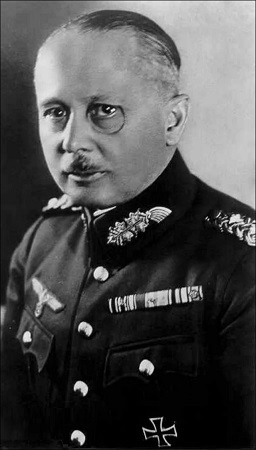
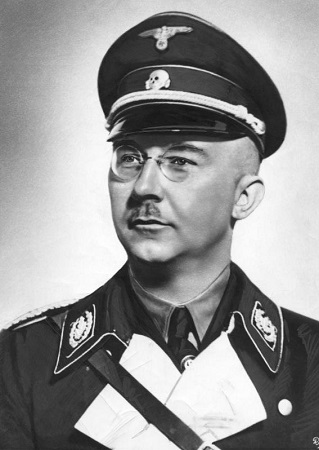
Generaloberst
Werner Freiherr von Fritch and
Reichsführer-SS
Heinrich Himmler (Wikimedia Commons)
Fritsch also had made a
dangerous enemy by consistently blocking the plans of
Reichsführer-SS
Heinrich Himmler, who aspired to build up an armed military
branch of his SS organization, independent of the Army: the
SS-Verfügungstruppe
(SS Special Service Troops). With Blomberg and
Beck’s backing, Fritsch was able to confine Himmer’s
military ambitions within narrow bounds. The Army controlled
the allocation of military manpower, equipment and weapons,
and Fritsch made sure to keep the
SS-VT
on short rations.
Thus by 1938 it amounted to no more than three regiments,
whereas the Army had fifty divisions. But the Reichsführer-SS was ill
content with this state of affairs, and for some time he’d
been pursuing efforts to get rid of Fritsch, his principal
opponent.
Earlier
in 1937 Himmler had presented Hitler with a dossier alleging
that Fritsch was guilty of homosexual misconduct, a serious
charge in that day and age. Hitler had waved the story aside
at the time but now, in the aftermath of the Blomberg
scandal, he seized upon it. Disliking Fritsch’s independent
attitude and his obstructionism, the Führer realized that
here were the means by which he could remove the
Commander-in-Chief of the Army and replace him with someone
more pliant.
Unfortunately for Fritsch, his personality and lifestyle
lent a degree of plausibility to the charge leveled by
Himmler. A lifelong bachelor whose world was his work, he
had the habit of forming friendships with younger men.
Fritsch’s reserved personality and rigid sense of propriety
ill suited him to combat an enemy like the unscrupulous
Himmler. When confronted in Himmler, Göring and Hitler’s
presence by the accuser named in the dossier, he was too
stunned and humiliated to mount an effective defense. Hitler
there and then suspended him from command of the Army,
pending an investigation. This was carried out by the
Gestapo and it included the indignity of an interrogation,
to which Fritsch unwisely consented. Finally, on 4 February
1938 he was officially dismissed from his command.
The
Army's senior leaders reacted with shock and consternation,
though some harbored an uneasy feeling that there might
possibly be a kernel of truth in the charge. They demanded that
Fritsch's case be examined by the military high court, the
Supreme War Tribunal—a demand that Hitler could hardly
refuse. But in March, the crisis that
would culminate in the annexation of Austria flared up, and Fritsch’s trial before the Supreme War Tribunal to be
suspended. When it resumed a week later he was completely
exonerated, it having been clearly shown that the evidence in the dossier
and the testimony of the accuser were false—cold
comfort, for Fritsch’s career lay in ruins. Hitler turned
down the suggestion that he be reinstated in command of the
Army, arguing that Fritsch’s replacement, Colonel-General Walther von Brauchitsch,
was already in office.
As a
senior general with no command, Fritsch had no option but
retirement. His formal rehabilitation in August 1938,
including an honorary appointment as Colonel-in-Chief of
Artillery Regiment 12, which he had once commanded, was no
more than a gesture. Depressed and sick at heart, he endured
a year of inactivity before reporting to his regiment on the
outbreak of war in September 1939 and accompanying it in the
invasion of Poland. A few weeks later he was killed by a
Polish sniper on the outskirts of Warsaw. Rumors, never
verified, claimed that the former Commander-in-Chief of the
Army had deliberately sought death on the field of battle.
Along
with Fritsch a number of other senior officers were
sacked—mostly, it seems, on the basis of their oppositional
or skeptical attitude toward National Socialism. General of
Artillery Wilhelm Ritter von Leeb, for example, was a
Catholic of Bavarian origin whose distaste for the Nazis was
well known. The forms, indeed, were preserved; he and the
others departed into honorable retirement. Two of
them—Leeb himself
and
General of Cavalry Ewald von
Kleist—were
recalled to active service when the war began. Both rose to
the rank of field marshal, only to be sacked again, Leeb in January 1942 and Kleist in
March 1943.
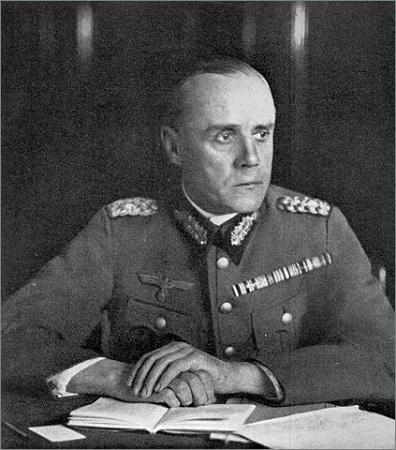
Generaloberst
Ludwig Beck (Bundesarchiv)
The
Chief of the General Staff, Colonel-General Beck, retained
his office, though growing more and more disillusioned with
the course of events. Beck's disagreements with Hitler over
Fall Grün
(Operation Green), the projected attack on Czechoslovakia,
led finally to his resignation on 10 August 1938. He was
replaced by General of Artillery Franz Halder.
The results of these twin
scandals greatly strengthened Hitler’s hand against the
Generalität—whose
members showed themselves no match for the Führer in a
political dispute. His authority at the head of the military
hierarchy was now unchallengeable, while his remaining
opponents in the Army’s higher echelons were left depressed
and demoralized. Events over the subsequent eighteenth
months would reveal that the Blomberg-Fritsch Affair
was an ominous milestone on Germany’s road to ruin.
